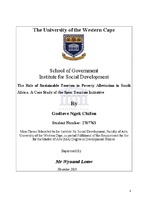The role of sustainable tourism in poverty alleviation in South Africa : a case study of the Spier tourism initiative
Abstract
In South Africa, poverty engendered by the apartheid regime has long been part of the fabric of the economy. Against this background of social marginalisation, material deprivation and individual vulnerability, tourism has over the years increasingly been mooted as a strategically important and lucrative sector that, if fully explored and exploited, would lead to sustained poverty alleviation in the Republic of South Africa. The central aim of this study was to establish whether tourism as evident in the Spier Tourism model is a sustainable poverty-reduction strategy. The specific objectives of this study were to examine the socio-economic impact of Spier tourism initiatives on its workers (previously disadvantaged individuals) and the local population, to assess the pro-poor tourism practices as implemented by Spier in relation to Rogerson's pro-poor approach, to identify the challenges that Spier is facing in its pro-poor tourism approach with respect to poverty reduction goals, to provide recommendations on how the challenges can be met most effectively and to examine how pro-poor tourism can be promoted and enhanced in South Africa. The study employed both the qualitative and quantitative research designs. Data were collected through different qualitative and quantitative techniques (in-depth interviews, focus group discussions, questionnaire). Summary findings indicate that Spier has positively contributed to the socio-economic improvement in the living standards (contribution to livelihood - increased income, enhanced health and food status), through job creation, improved education/healthcare, empowerment through training and skill development, investment in the corporate social responsibility. However, Spier is still grappling with challenges such as racial disputes, insufficient income of employees and unqualified staff to mention a few. This study makes several recommendations which are based on the findings.

